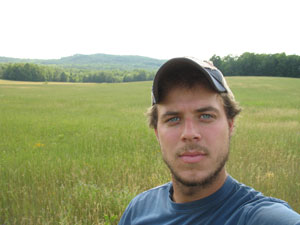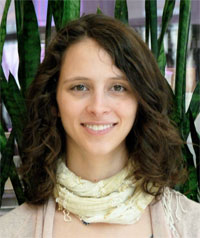
Anders Gurda
Can pork from the Driftless region in southwestern Wisconsin attain the cachet of Iberian ham?
Can a mob of cows manage Canada thistles?
Caitlin Henning and Anders Gurda, who both secured Annual Fund-supported graduate assistantships in the University of Wisconsin-Madison’s Agroecology Master’s Program in the College of Agricultural and Life Sciences, plan to find out. They approach their projects with an energetic optimism to work with local farmers to find ways to sustain communities, reduce the use of chemicals and increase profitability.
Begun six years ago, the UW-Madison’s agroecology master’s program is unique in the country. It takes a comprehensive approach to agriculture, ecology, economics and culture, co-chair Michael Bell said. Agroecology also brings together scholars and scientists across campus in support of successful farming communities.
The Annual Fund investment in graduate assistantships allow professors to identify students ready to begin their research, Bell said. The goal is to leverage their initial work to attract grant dollars to continue the projects to benefit agriculture, the environment and the community.

Caitlin Henning
Henning, a Northwestern University graduate, looks to Iberian ham to illustrate the successful results of marketing a regional taste. Europe effectively encourages markets for regional products – think of champagne produced exclusively in the Champagne region of France — through highly regimented protections, she said.
The Driftless region’s steep hills, shallow soil and unique climate produce geographically determined agricultural products, said Henning, who will continue her work through the Center for Integrated Agricultural Systems. The question is how to market them in a way that will improve the farmers’ bottom line and honor the way they care for the land. “How do small scale producers show their product is quality?” she asked. “How do they find a market without government protection?”
The American Vintners’ Association has designated the Upper Mississippi Valley, including the Driftless area, as a wine-growing region. Henning would like the same kind of branding power applied to Driftless apples, cheeses and pork. She is planning a May summit for Driftless pork producers to share information and listen to their challenges.
A mob of cows
When Gurda talks about cows, he speaks of mobs or pounds per acre, not the usual herd. Mob grazing, he admitted, is controversial, but he’s interested in whether it can be used to control Canada thistle without chemicals.
Gurda, a Northland College graduate, comes to his project after four years of working with community gardens, small-scale organic vegetable production and youth educational programs In New York City, Olympia, Washington, and Minneapolis. “I wanted to be able to understand more than I was teaching my fifth-graders,” he said. Professor Mark Renz’s work to control Canada thistle opened a door to more education and an opportunity to complete some of the first research on mob grazing.
Mob grazing is similar to how buffalo graze, as they cluster together to protect the herd from predators, forage intensively and move on, leaving manure in the well-tilled soil to nourish regrowth. Electric fences replace predators to contain mobs of cows that are moved often, allowing pastures to regenerate. A 100-cow mob, for example, would graze on about half-acre paddocks and might be moved several times a day, Gurda said. The research will show whether the cows will eat everything, including thistles, when their choices are limited.
When he sets up test mobs this summer, Gurda also will visit with farmers about how they learn new techniques and decide whether to adopt them. His goal is to work with farmers to help them discover and adopt the best of new strategies.
Attracting talented students
Henning and Gurda would not be at the UW-Madison without research assistantships supported by the CALS Annual Fund. “It’s a gift,” Gurda said of the assistantship that made it possible for him to afford the University graduate program. “I can’t believe I’m getting paid to do something I love and feel passionate about.” The assistantship feels like a dream, Henning said, adding that agroecology is not about getting rich but about making a meaningful, socially engaged impact.
The Annual Fund is vital to support CALS core educational program and its top priorities, including enhancing student opportunities, Dean Kathryn VandenBosch said. It helps attract outside dollars and allows CALS to be nimble in addressing developing opportunities or issues. CALS also recently used the Annual Fund to support raspberry research and to top off a grant to the Department of Zoology and remodel teaching labs, improving the laboratory experience for thousands of introductory biology students each year.
For Gary Sommers from Meadowdale Farms in Clinton, Wisconsin, giving to the Annual Fund means he believes the College will know how to make the best use of his gift. “If I didn’t believe that, I wouldn’t give to this fund,” he said. Sommers, a farm short-course graduate, said he believes supporting CALS is important, not only for him but for the future.
